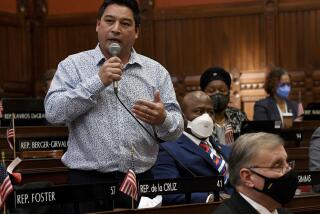Taking Down the ‘For Sale’ Signs
- Share via
In 1987 members of Congress supplemented their $89,500 annual salaries by pocketing just under $10 million in payments for outside public appearances. For a fee limited to $2,000 per occasion, legislators delivered hundreds of speeches, sat on scores of panels or simply lent their presence to the conventions and colloquia of special-interest groups. The fees paid for these activities are known as honorariums. Hiding behind that genteel-sounding word is the sordid and unmistakable practice of influence buying.
Comparisons that have been made between the sources of honorariums and how legislators tend to vote suggest that the payers of handsome fees usually get their money’s worth. The trucking, broadcasting, securities and dairy industries, to name just some of the larger special-interest hirers of congressional talent, spend hundreds of thousands of dollars a year augmenting the incomes of key committee members. Congress, which sets its own rules on outside fees, currently allows House members to accept honorariums totaling up to 30% of their salaries, or $26,000. Senators can accumulate fees up to 40% of salary, or about $35,000. These generous limits allow legislators to be exposed to diverse lobbying groups.
The same Congress that zealously and properly monitors conflicts of interest in the executive branch is curiously insensitive to the evidence of its own abuses. It is also notoriously timid about raising its own pay. The link between these two issues has long been noted. Legislators complain often that their salaries are inadequate to cover such job-related expenses as maintaining two residences and covering family commuting costs. But rather than invite possible political heat by raising its pay to meet the added burden of public service, Congress prefers the sleazier if less visible route of getting income supplements from private sources. In the end the public pays anyway, through higher prices for whatever the special-interest groups are currying favor to get.
In late 1986 a presidential commission proposed raising compensation for many federal officials in all three branches of government. Under that plan Congress’ pay would go as high as $135,000. Now House Speaker Jim Wright (D-Tex.), who is no stranger to controversies about personal financial ethics, has become the latest congressional leader to advocate a boost in congressioal pay and a simultaneous prohibition on accepting honorariums. What would be gained? Ideally, a Congress far more likely to resist the temptations dangled before it by well-heeled special-interest groups--in other words, a Congress better insulated against the implicit corruption that the current system encourages. Abolishing honorariums could go a long way toward taking down the For Sale signs that seem so shamefully to hang in front of too many congressional offices.
More to Read
Get the L.A. Times Politics newsletter
Deeply reported insights into legislation, politics and policy from Sacramento, Washington and beyond. In your inbox twice per week.
You may occasionally receive promotional content from the Los Angeles Times.










